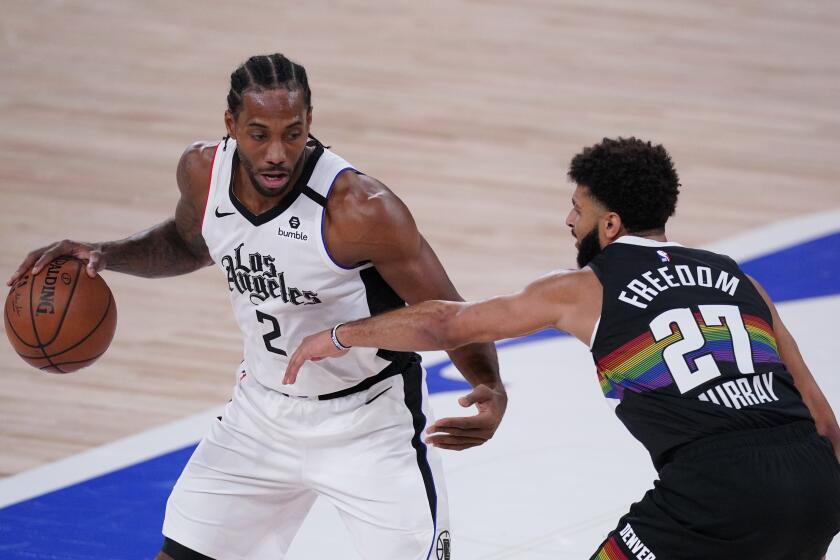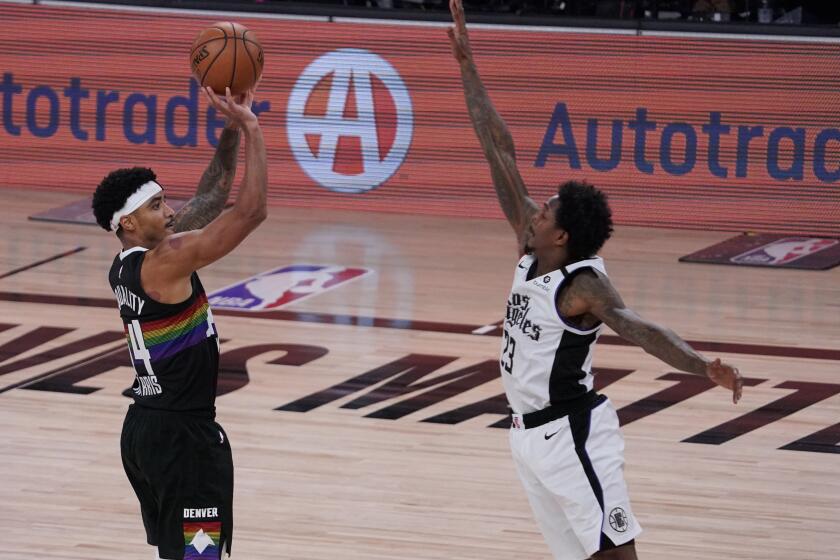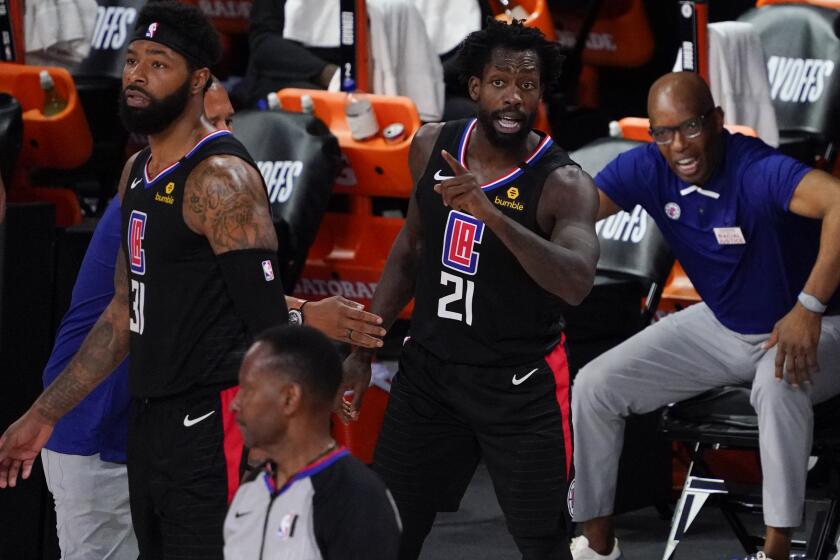Efficient Clippers beat the odds, and the Nuggets. Five takeaways from Game 3
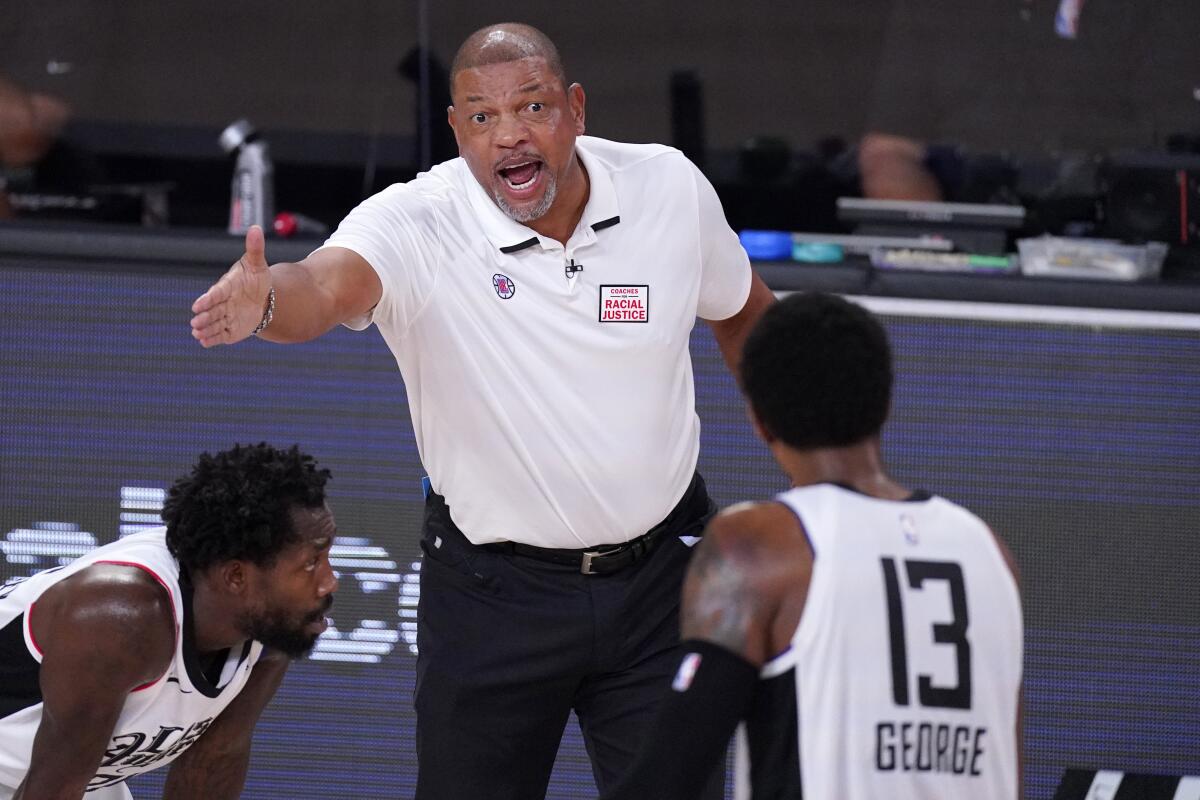
- Share via
Hand various coaches a box score, and their eyes go to different places.
Some look first at turnovers. Others seek out an opponent’s three-point shooting. For those upset with officials, there is always the difference in free-throw attempts. It is an individual response that changes from sideline to sideline.
What Clippers coach Doc Rivers couldn’t look away from Monday, after his team’s 113-107 victory over Denver to take a 2-1 lead in their second-round series, was the disparity in field-goal attempts. He mentioned it three times during his postgame interview.
“They took 19 more shots than us,” he said. “It’s hard to win a game. Can you imagine giving the team 19 more shots and think you’re going to win the game? You have to be so good offensively to win that game, and basically that’s what we were.”
Though they made only 35% of their three-pointers, the Clippers shot 68% inside the three-point arc and also made 20 of their 26 free throws — 16 more free throws than the Nuggets attempted.
The Clippers were sloppy against the Denver Nuggets, but with eight minutes to play, they forgot the mistakes of the recent past and lived in the present, writes columnist Helene Elliott.
But field-goal attempts weren’t the focus of Nuggets coach Michael Malone.
Here are our five takeaways from the Clippers’ Game 3 victory:
1. The Clippers ranked a respectable 11th in transition points during the regular season, but they’ve never been a team whose offense begins with pushing the ball upcourt. Given multiple opportunities to run on Denver in Game 3, however, they took advantage for 30 points — the second-highest number of fast-break points they’ve scored all season, and 11 more than their previous high from this postseason.
“To me the story of the game was transition,” Malone said. “Game 1 was one-on-one defense; Game 2 was their offensive rebounding. Tonight they had 30 fast-break points, which is unacceptable.”
The first basket came four minutes into the game when JaMychal Green, in at center early because Ivica Zubac had picked up two quick fouls, blocked Paul Millsap’s baseline drive and the ball spurted out to Kawhi Leonard, who threaded a pass with his right hand between Jerami Grant and Gary Harris for a layup by Patrick Beverley.
Beverley was pivotal in building the Clippers’ 18-point advantage in transition points. The Clippers scored 10 fast-break points in the fourth quarter alone, a boost that began when Beverley poked Monte Morris’ dribble away, right into Paul George’s hands. Three dribbles later, Green scored a layup for an 88-88 tie. Just 90 seconds later, with 10 minutes to play, Beverley blocked Michael Porter Jr.’s shot as he rose to shoot and finished at the other end with a layup for a 90-90 tie.
2. Between the first and second games of this series, Rivers was asked about his philosophy of allowing players to be themselves. To illustrate his approach, he recalled his first meeting with Lou Williams after the Clippers acquired the guard in a 2017 trade with Houston.
“When I got Lou, I told Lou, ‘I just want to make it clear, when we’re bringing you in the game, we’re not bringing you in to be a defensive player, we’re bringing you in to score,’ and he started laughing,” Rivers said. “I said, ‘I’m being very honest here. You are an offensive player, and be that.’”
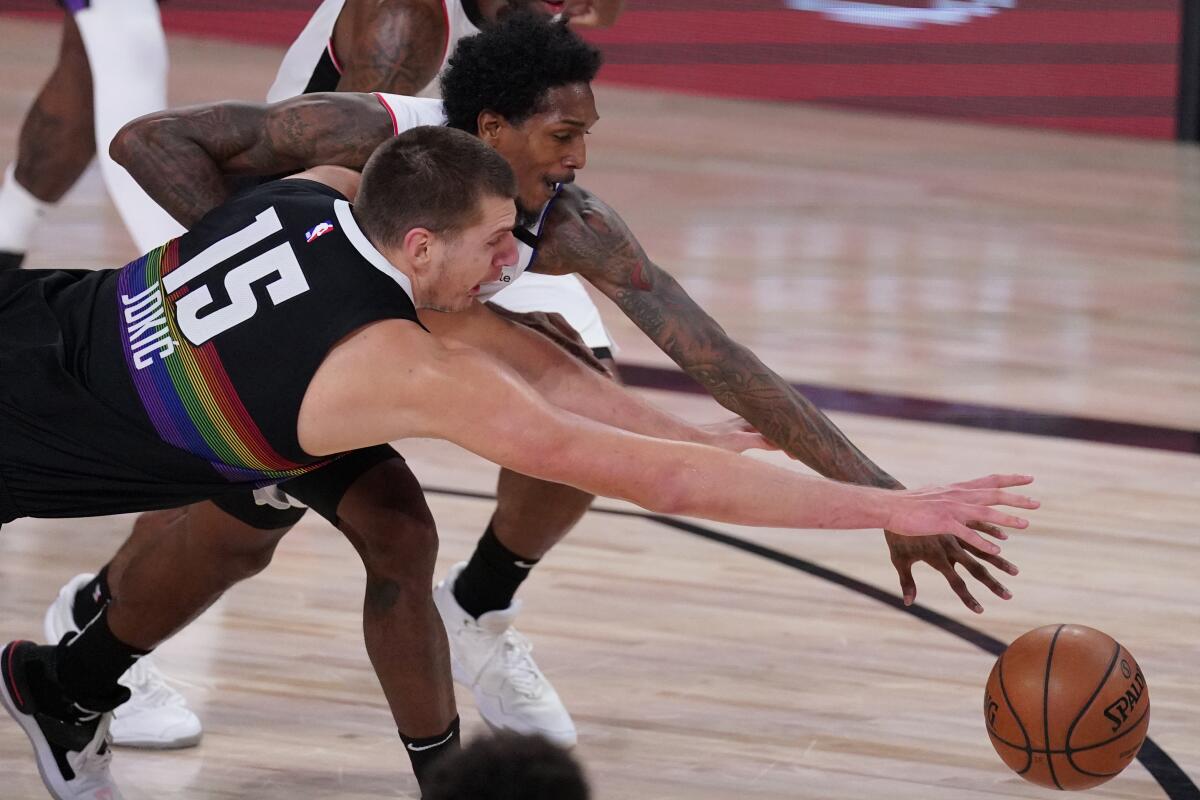
Williams has scored more points than any reserve in NBA history. Malone has suggested the 33-year-old guard should, in retirement, teach a class on the art of drawing fouls, calling him a “master.” No one talks about his defense in such glowing ways.
Yet Williams defended hard and effectively during the Clippers’ comeback. His pair of steals less than 45 seconds apart in the second quarter led to transition layups and helped cut Denver’s 12-point second-quarter lead to two by halftime. The Clippers’ defensive rating has tightened considerably when he has been on the floor this series, to 99.4 points allowed per 100 possessions. That was certainly not the sort of effect he had during the first round, when the Clippers allowed 120 points per 100 possessions during his minutes, and the defensive help has been all the more necessary because of his offensive inconsistency to begin this series. (He had missed his last 14 three-pointers before sinking one from the corner Monday.)
“Tonight is a game that we can build on as far as intensity goes,” Williams said. “Last game, I thought we didn’t play with a lot of intensity; that cost us the game. Fourth quarter, we kind of got going. We can’t wait, especially with a team like Denver.”
3. As much as the Clippers’ defense came to life to close the second and fourth quarters, it was shredded at the start for a third consecutive game.
In first quarters this series, Denver has shot 62.3%, made 50% of its three-pointers, averaged 35.3 points and turned the ball over an average of just 1.3 times. Among the eight teams playing in the conference semifinal round, those marks rank at or near the top of all offenses — leaving the Clippers’ defense on the opposite end of the spectrum. One of the few saving graces has been limiting Denver to just 1.7 free throws per opening quarter.
Lou Williams didn’t take over on offense during the Clippers’ win over the Denver Nuggets on Monday, but a few key shots and stops have displayed his impact in the series.
“We’re not perfect; never said we were,” Paul George said. “That’s an area that we have to clean up. We’ll address it tomorrow. Try to be better for Game 4.”
The Clippers have managed to survive in two of the three games because of their own hot shooting. But such porous defense, mostly by the starters, has consequences if it leaves the second unit with a deficit to close. The Clippers can’t ask reserves who have struggled to find consistency to bail them out.
4. Before the first-round series with Dallas, Rivers told backup center Montrezl Harrell that his role would be reduced. Part of it was that Harrell had just returned from a month away from the team while mourning the death of his grandmother. Part was the matchup. Rivers said Harrell understood the reasoning and accepted.
Harrell had his moments against Dallas, but the time away sapped much of the effectiveness that made him the league’s top reserve this season. That has carried over into the second round, as well. Though Harrell will always provide energy, it has yet to translate consistently into effectiveness. Harrell is averaging 2.4 defensive rebounds per game since returning for the playoffs — almost half the 4.5 he averaged during the regular season — and defended inconsistently, with one block in his last three games.
When starting center Ivica Zubac was whistled for two fouls in the first quarter, Rivers’ first substitute was Green, not Harrell.
Clipper Patrick Beverley was fined $25,000 by the NBA on Monday for his ‘verbal abuse of a game official’ during his team’s loss Saturday to Denver.
5. George produced one of the best individual performances by a Clipper this postseason while scoring 32 points on 12-of-18 shooting, including making five of his seven three-pointers, while also taking on the assignment of guarding Denver’s Jamal Murray.
Murray made five of his 17 shots and only two of his seven three-pointers. He missed all six shots he took while guarded by George, according to ESPN Stats and Information.
“I know he made some big plays offensively,” Beverley said. “But his energy, defensively, blowing up screens, picking up, that’s what I thought I was most impressed with.”
The Clippers have been exceptional defensively when George guards the ball handler, such as Murray, in pick and rolls. Murray did have open perimeter looks off of screens and just missed the kind of shots he was making en route to scoring 50 points twice against Utah in the first round. But George was also active in such situations in Game 3, and the hustle contributed to the off night by Murray and Denver’s cold-shooting fourth quarter. Case in point was Denver’s possession that began with 3:30 remaining in the fourth quarter and the Nuggets trailing by three.
Once Murray passed to Jokic near the baseline, George sprinted over to trap the center. When Jokic quickly passed back to Murray, George made it halfway back before seeing Leonard had covered his rotation. George quickly spotted Jerami Grant open in the opposite corner and closed out with a hand up on Grant’s missed three-pointer.
“PG’s 32 [points] was huge,” Rivers said, “but his defense was far more impressive for us.”
More to Read
Get our high school sports newsletter
Prep Rally is devoted to the SoCal high school sports experience, bringing you scores, stories and a behind-the-scenes look at what makes prep sports so popular.
You may occasionally receive promotional content from the Los Angeles Times.

